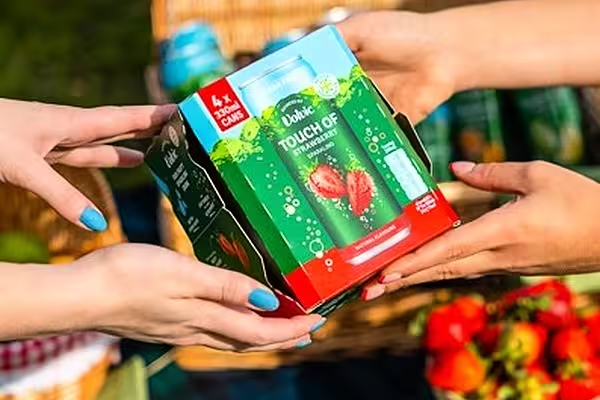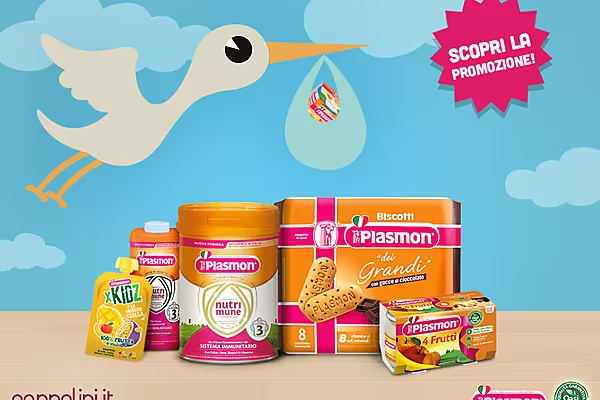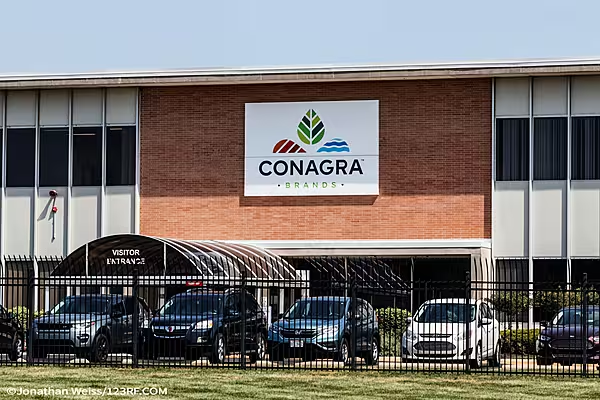We are in very turbulent times, but our food industry is in a pretty resilient state. We have mastered crises in the past and we will master this one. That was the uplifting message from Michael Murphy, interim CEO of Bord Bia, when he spoke to Maev Martin about some of the food and drink companies they are supporting at a time of unprecedented pressure in the market.
Michael Murphy was appointed as interim CEO of Bord Bia in April of this year.
While he has only been in the role for three months, he is experiencing a baptism of fire as he seeks to assist food and drink manufacturers to cope with the demands of a market that is in the midst of a perfect storm.
“There are issues that food and drink companies were dealing with prior to the impact of the current wave of inflation, particularly around sustainability, such as bringing products to market that meet customer needs, especially regarding packaging, and showing what they are doing to help create a better world, and those challenges will remain,” he says.
Many might assume that the consumer desire for brands to operate ethically and have a positive impact on the environment will take a back seat in an era of increasing cost inflation, but Michael doesn’t believe that this will be the case.
“Sustainability is critical and on consumers’ minds, irrespective of the current disruption caused by inflation and the war in Ukraine,” he says.
“In fact, consumers tell us that they believe it will become even more important in terms of how they make decisions in the future.
“The inflation issue will be a challenge, not just for families, but for the entire food industry, at retail, producer and consumer level, and it is about finding the best way to navigate those challenges. There are underlying costs in the system that food companies need to recover from the market place, so we work with food companies to help them understand costs and what the likely costs will be going forward. And we also help them to explain the costs they are facing to customers, so they are better able to recover those prices from the market. Energy prices, fertiliser and feed prices are all rising," he adds.
"The projection was that inflation would peak at 8.5% and now it has gone to 9.6% for the month of June, so inflation is the highest it was since the early 1980s. Inflation is the single biggest issue at the moment for retailers, manufacturers and customers. The other big issue is the area of clean labels. Consumers want to know more about what is in their food and understand more about the companies that produce their food. The industry will also need to demonstrate that it is doing its bit to reduce emissions. And we then have the changing technology landscape – how much is sold online, how much is sold in bricks and mortar stores, and how can companies best market themselves and their products via digital technology. Those are big game-changers for food and drink companies.”
Unlocking E-commerce Potential
An online retailing study from Bord Bia, published in 2021, shows that in the three years since 2017, online shopping has grown by 75%. In the next three years to 2023, this was forecast to grow by a further 55% (source: Statista).
Bord Bia’s Think Digital programme was introduced 18 months ago to help food and drink companies to unlock the ecommerce potential within the sector to deliver much needed growth. “The programme aims to inspire, enable and support clients to engage effectively with their consumers and customers online, in order to achieve commercial success for their businesses,” he says.
“It is primarily provided through a series of virtual workshops, webinars and self-service digital marketing guidebooks. Companies can also apply for bespoke, one-to-one digital mentoring, digital project management, and branding supports.
“For example, with Atlantis of Kilmore Quay, we had the pleasure of working with them on the development of their direct-to-consumer offering, in the form of a new e-commerce website, in order to help them navigate the challenges of Covid-19. In the first instance, we helped them with their brand development and then the design and development of a new e-commerce website. More recently, we soft launched the new Burren Smokehouse e-commerce website, and following some brand development work with Micil Distillery, we also launched their website after helping with them to create an e-commerce offering.”
In addition to elevating the digital capabilities of the sector, Bord Bia is also focusing on how to support and prepare companies to successfully sell on some of the world’s leading online marketplaces such as Amazon, Ocado, Walmart and Alibaba. “
We are working directly with these companies to develop bespoke ‘how to’ guidelines for the Irish food industry, enabling them to compete at a global scale,” says Michael.
Bord Bia is also focused on identifying opportunities for selling Irish meat and seafood online. Although approximately 94% of the EU population eat meat and/or seafood, the study highlighted that only 56% buy those products online.
However, 44% of online grocery shoppers who are currently not buying meat online are open to buying beef online, and 54% of online shoppers who are currently not buying seafood online are open to it, which suggests untapped potential for both sectors.
Responsible Living
Bord Bia has identified some food and drink trends that are likely to gain traction during the remainder of this year and into 2023. “There will be a lot of innovation around responsible living, such as how food products help consumers to do the right thing,” he says.
“We are seeing more examples of companies, whether through innovation or through further information on pack, trying to help consumers make informed decisions about what and how they consume food. For example, Bewley’s, who are the largest supplier of Fairtrade coffee to the Irish market, are in the process of actively developing an ESG strategy and the company will be announcing some new sustainability initiatives that are not yet in the public domain. However, those that are in the public domain include their becoming the first certified carbon neutral coffee company in Ireland in 2009 and becoming the first company to introduce a Fairtrade product to the Irish market in 1996.”
This is in addition to the many sustainability targets achieved through Bewley's Origin Green membership, including reducing their CO2 emissions per tonne of manufactured product by 62% since 2006 and reducing their waste to landfill by 84% since 2010.
Meanwhile, Guinness is undertaking one of the most ambitious regenerative agriculture pilots to take place on the island of Ireland.
“This extensive, three-year farm-based programme is about highlighting opportunities for reducing the carbon emissions of barley production,” he says.
“The key outcomes are expected to include improvements in soil health and its carbon sequestration potential, enhanced biodiversity, a reduction in synthetic fertiliser use, enhanced water quality, and improved farmer livelihoods. Guinness will work in collaboration with Irish farmers and suppliers to understand the most effective regenerative practices, and to adapt to the local context and the specific needs of Irish barley production.”
Keogh’s is another company highlighted by Michael for its responsible living initiatives, in particular its work helping farm communities in Ethiopia.
The crisp company has joined force with Vita, the Irish-based international development agency, in the highlands of Southern Ethiopia where they have established potato cultivation in the region.
“They have given the farmers of Southern Ethiopia the knowledge and the power to farm and produce their own potatoes,” he says.
“Keogh’s are also providing them with the know-how and the tools to grow, harvest, and most importantly, store their crop, especially when needed for the hunger months each year.”
Imbibe Coffee, which started roasting in May 2018, decided to adopt the business model of ‘conscious capitalism’, meaning that 1% of all coffee sales would go to Women’s Aid, 1% to projects at coffee origins, and a further 1% would be shared among staff.
“Their zero waste Coffee to Cans product on the wholesale side of their business is a perfect example of the circular economy in action as it sees them deliver five kilo cans to customers, collect the old ones, bring them back to the roastery to be cleaned, and then they go out again,” says Michael.
“Over 90% of their wholesale deliveries are done in this way.”
Origin Green
Bord Bia recently celebrated 10 years of Origin Green with the launch of the Leaders Sustainability Acceleration Programme.
“We carried out a survey at the end of last year and about 80% of companies at a leadership level said they would like more knowledge about how they could integrate sustainability into their business strategies,” he says.
“Many of the founder members of Origin Green and other companies have signed up for first programme, which will begin in September, and we will run another programme at end of 2022 and two in 2023 and 2024.
“Origin Green is still a global first as a national sustainability programme, with 300 plus companies setting detailed plans on sustainability and reducing their emissions over five-year plans. We have industry professionals from all over the world visiting us on a weekly basis who want to know more about Origin Green. The director general of the UN FAO, which is based in Rome, was here recently because he wanted to better understand Origin Green, and saw it as a great example globally of how an industry can successfully take on an issue within the sustainability sphere.”
Now that the programme has reached the 10-year mark, Michael cites the achievements that he is most proud of.
“One of them has to be the fact that 55,000 farmers have seen a reduction in the region of six per cent in the carbon per unit of beef and dairy over the past ten years,” he says.
“And we have also seen examples where farmers can reduce it by 20%, which is best practice, and that gives us great hope for the future. In addition, we have carried out 300,000 carbon footprints on farms in Ireland to date, as our 55,000 farmers do this every 18 months when they have a new audit," he adds.
“We are also impressed by the shift that our food industry has made to the point that we now have 2,800 targets among 300 food manufacturer members of Origin Green. Retailers and service operators have also been added to the membership profile of the programme and they are demonstrating their sustainable credentials. Another big positive to emerge from the Origin Green programme is the impact it has on our global customers who recognise Ireland as a leader in this space. A Bord Bia survey revealed that 60% of our global customers and buyers choose Ireland as a supply base because of Origin Green. We are seeing the impact of it with buyers, in particular, because they see the country as a great home of sustainable food, so it has repositioned Ireland globally in a very positive way.”
Companies that are part of the Origin Green Gold Membership programme, which was launched in November 2020, are continuing to increase their plans and targets around sustainability and, to date, 51 companies are gold members of the Origin Green programme.
“We introduced mandatory emission reduction targets as part of Origin Green companies’ strategic plans at the end of 2021 and we are seeing this in some of the company plans so far,” he says.
“We think it will have a very positive impact on the emissions of the wider Origin Green membership, but it probably won’t be evident until we review those plans next year.”
Sustainability – Where Is The Industry At?
Regarding the stage that most food and drink company CEOs and their senior management teams are at on their sustainability journeys, Michael says that the areas that companies have made most progress on are water, waste, and energy usage.
“They have got on top of those areas in terms of how they can make an impact and reduce usage,” he says.
“They have also made progress on giving more wellness benefits to consumers from the food that they eat, in particular by giving additional functionality to foods. We have seen quite a bit of action on that, and also on the wider area of social responsibility, where companies are making a contribution to their workforces in terms of diversity and inclusion. Lots of companies are making great strides in that area. Food and drink companies are very conscious of the need for sustainability to be a central part of their overall strategies, so now it is about them doing that and us helping them to do it. That ties in with the acceleration programme, which helps leaders to make sustainability work for them throughout their entire business.”
What are the most significant findings of Bord Bia’s recent consumer lifestyle trends studies that food and drink companies must take on board?
“The one that strikes me most is that three quarters of consumers globally are willing to make changes in their own lifestyles and hard choices because of climate change, so that will affect the products they buy in the future,” says Michael.
“The other big takeaway is that 70% of food and drink buyers are saying that sustainability and strong sustainability credentials will be a big factor in deciding who they buy their products from.”
A Strategy For The Future
Bord Bia published its ten year and three year strategy in January.
According to Michael, the strategy is about “nurturing a thriving future” for Ireland’s food and drink industry.
“Core aspects are developing proof points for food brand Ireland and the sustainability programme really helps with that,” he says.
“The second aspect is all about finding better ways to connect Irish companies with customers globally and in Ireland. The third body of work is around developing talent through training and development, and attracting new talent through talent programmes. The fourth aspect is about using insight to position Irish food and drink companies as extremely knowledgeable, so they can make the right decisions around their brands and ensure that those insights really deliver for consumers.”
Whether Brexit, sustainability or inflation, the Irish food and drink sector is facing into challenging times.
“For Bord Bia, it is about helping companies to be agile and respond to those challenges,” says Michael.
“We have a very talented workforce in Bord Bia and we have also attracted a lot of very talented people from industry, so there is a lot of support there for food and beverage companies to navigate the challenges ahead. We run five industry talent programmes to attract people into the industry. One of these, the Marketing Fellowship Programme, is currently recruiting talented executives and the deadline for applications is the end of July. In the autumn we will recruit graduates into our International Graduate Programme, so there are lots of opportunities for young graduates to carve out a career in the food and drink industry.”
Read More: Bord Bia Launches Retail Partnership To Support Growth Of Irish Organic Produce
© 2022 Checkout – your source for the latest Irish retail news. Article by Maev Martin. For more A-brand news, click here. Click subscribe to sign up for the Checkout print edition.









